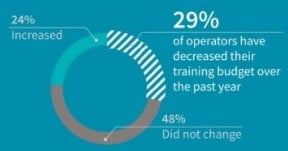COVID-19 has vastly affected shipping in general, but maritime training has felt the impact the most. Covering this issue, this year’s MarTID survey aims to uncover the challenges that have arisen and the industry’s response.
Training budgets
Past surveys have revealed a consistent trend of growth in training budgets for vessel operators. About 30% reported a decrease in this year’s training budget when compared to last year’s, while another 50% saw no increase in their budgets. Analyzing the causes, many of the respondents cited COVID-19 as the cause of the reduction or lack of growth.

However, maritime training institutions were not affected the same way. In fact, 45% of training institutions increased their training budget over the previous year, while almost 60% indicated that they expect their budgets to increase the following year.
E-learning grows
Despite the difficulty in maintaining in-person training due to the pandemic, face-to-face classroom training was still cited as the most commonly used training method, with 85% of operators using it to a high or medium degree.
Nonetheless, even with its continued high utilization, face-to-face training experienced the largest decrease in usage, with 60% of respondents reporting a decrease from the previous year. A further 25% expect to utilize it less in the coming year.
The second most used training method, e-learning using internet-based sources, was reported to be in high and medium usage by 76% of respondents. A full 80% of operators saw an increase in internet-based e-learning usage. Three quarters of the respondents anticipate a further increase of internet-based e-learning in the coming year.
Seafarers pay for training
According to the report, there was a notable increase in the amount of seafarers paying for their training, as more than half of the respondents self-funded their training.
COVID-19 reduced training levels
The COVID-19 pandemic has affected many education and training regimes negatively, and the report confirms that the pandemic has had a negative effect on training with training levels having been reduced for both operators and maritime training institutions.
More specifically, over half of operators saw a decrease in their training budget due to the pandemic and nearly 70% felt that overall training delivery was reduced.
Notably, 17% saw a budget decrease of more than 75%. In terms of methodologies, more than 75% of operators who responded indicated that they had moved nearly all in-person training to remote methods.
These are expected reactions as nearly 90% of operators report that their ability to deliver training has been affected by travel restrictions and other impediments.
In addition, more than 60% of responding operators expect that this training slowdown has created a backlog which will have to be cleared as the effects of the pandemic ease.
What is more, the pandemic has also caused seafarers to rethink their career as seafarers, and maybe choose another profession. According to the report, one third of responding seafarers report that they are less likely to remain in their current career due to COVID-19.






























































